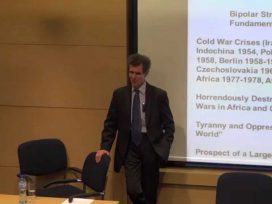The Swiss vote to ban minarets has less to do with a “populist factor” inherent in referenda than with resentment at high-level corruption and the fear of social declassification. Celebrated by rightwing parties across Europe, the vote augurs more popular Islam-baiting to come.
Articles
Read more than 6000 articles in 35 languages from over 90 cultural journals and associates.
The revenge of the beer fiddlers?
The regulation of amateurs in musical life
Cultural sociology has frequently described the growing professionalization of culture as an inevitable manifestation of socio-economic rationalization. Yet the persistence of the amateur in contemporary culture contradicts this picture, writes Rasmus Fleischer. The three hundred year-old struggle between professional and amateur musicians in Sweden shows that cultural professionalism is not a simple expression of an all-embracing economic logic, but generated and sustained by specific institutions.
Kigali's ambassador-at-large
How Philip Gourevitch wrote the victors' history book
With his book about the Rwandan genocide, Philip Gourevitch has perhaps more than anyone influenced the way the conflict is viewed in the US and Europe. But his view is clouded by over-simplifications and a glorified view of the Kagame government, writes Swedish journalist Felix Holmgren.
The forgotten slaughter
An interview with Marie Béatrice Umutesi
Both Hutus and Tutsis committed crimes against humanity in the conflict in Rwanda, says author Marie Béatrice Umutesi in conversation with Swedish journalist Felix Holmgren. The international community first betrayed the Tutsis, then the Hutus.
Whereas in postmodernism, being was left in a free-floating fabric of emotional intensities, in contemporary culture the existence of the self is affirmed through the network. Kazys Varnelis discusses what this means for the democratic public sphere.

The entry of climate change into the media mainstream, as welcome as it is, nevertheless brings new problems. Journalists, campaigners and scientists discuss the implications of demand-led reporting, the exploitation of public misunderstanding, and the dangers of focusing on “charismatic megafauna”.
Estonia was ruled for centuries by the Germans, Swedes and Russians, who took turns to settle their accounts on the territory or arbitrarily lumped it together or split it with neighbouring areas. The narratives of the Estonian peasantry, the Baltic German gentry, the Swedish nobility or the Soviet functionaries, although running parallel, do not have a common addressee. The narrative told by Estonians in exile, in the second half of the twentieth century, is also not easily reconcilable with the story of their compatriots back home. The solution is a synoptic approach, says Tonu Onnepalu. Instead of striving towards a single, continuous and comprehensive historical narrative, at least three different histories in three different idioms must be read in parallel.
Literary perspectives: Lithuania
Almost normal
The literary field in Lithuania has established itself since independence, despite vastly smaller print runs and the onslaught of the mass media. Today, a range of literary approaches can be made out, writes Almantas Samalavicius, from the black humour and social criticism of the middle generation to the more private, realistic narratives of the post-Soviet generation.
Now that Marxism is dead and buried, so it is said, we can read Marx afresh. Yet to do so, writes Anders Ramsay, previous interpretations of Marx need to be corrected. In particular, that which sees money and credit as surface phenomena, based on Marx’s naturalistic understanding of value as being inherent in a commodity. This strand of Marxism overlooks the contemporary role played by credit in the reproduction of capital.
Environmental justice tends to halt at national boundaries, ignoring the correlation between environmental harm and other social factors such as race, gender and class. A more cosmopolitan notion of justice is required that considers the situation of individuals in cross-border and international contexts, argues Jonas Ebbesson.

Gorbachev's go-ahead
András Schweitzer in conversation with Mark Kramer
Nothing was inevitable. If the Soviet Union had wanted, it could have easily stopped the process that led to the dissolution of the Communist bloc in 1989 – says Professor Mark Kramer, director of the Cold War Studies Program at Harvard University. As he sees it, the changes were ultimately caused by three factors, neither sufficient in itself: the fundamental change in Soviet policy reflected in Mikhail Gorbachev’s commitment to promote far-reaching reform and avoid the use of violence in Eastern Europe, the willingness of millions of ordinary people to go out onto the streets to demand freedom, and the rapid demoralization of hardline East European leaders as they realized that the Soviet Union would not come to their aid against internal rebellion.
Guns, fire and ditches
A report from Tatárszentgyörgy on the Roma killings
Zoltán Tábori reports from Tatárszentgyörgy, where in February 2009 a house belonging to a Roma was torched and the owner and his son murdered, the seventh in a series of attacks that left six Roma dead and three injured. Tábori’s conversations with Roma and non-Roma villagers gives a disturbing insight into the spiral of crime and resentment in small communities facing increasing competition for employment and education.
Well-meaning but badly designed government policies which aim to lift the Roma out of poverty have tended to have the perverse impact of reinforcing difficulties associated with them. On the background to the spate of anti-Roma violence in Hungary in 2009.
Are newspapers still relevant?
Journalism at the dawn of a new age
“Good journalism is good whether in print or online” writes the political editor of the Süddeutsche Zeitung. It is not the Internet that is responsible for the “crisis of the press”, but subordination of journalism to the market. The increasing pressure to make a profit means that German journalism risks becoming trivialized.
Every day is Copenhagen
A breakthrough in international climate policy is still possible
Neither the industrialised nor the emerging countries are able to solve the climate problem by “going it alone”, write Claus Leggewie and Dirk Messner. In Copenhagen, the European Union needs to table a set of exacting reduction targets, without conditioning them on the willingness of others to follow suit.